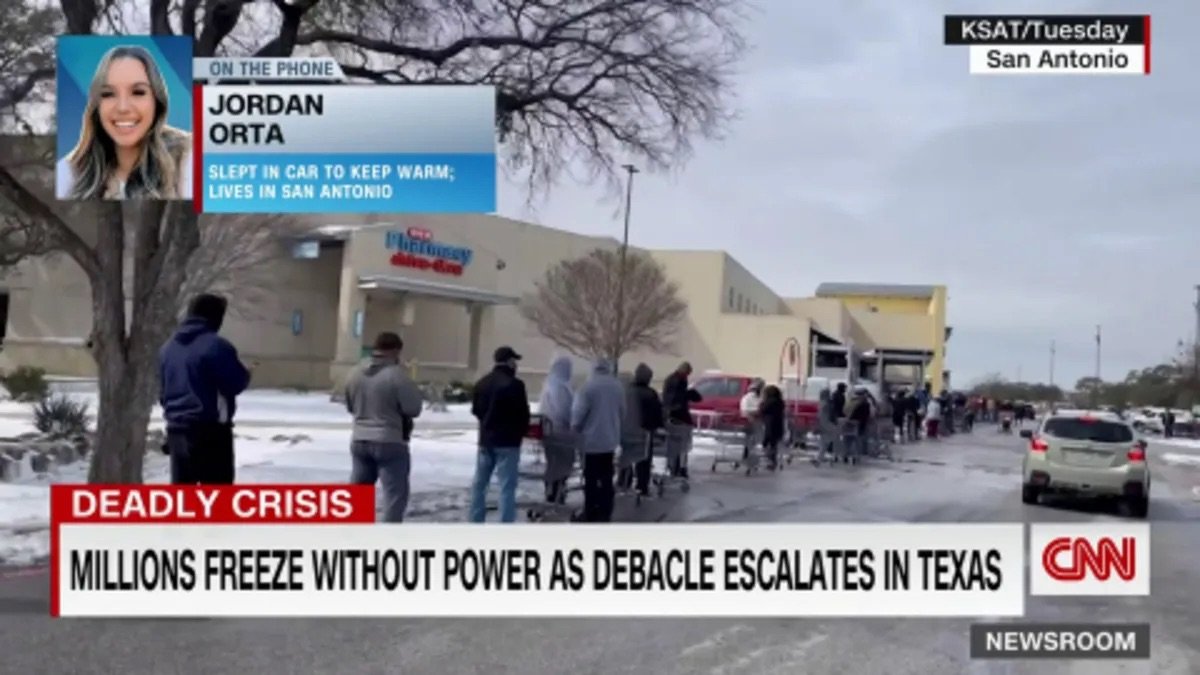What Do You Call a Failed State Inside a Failed State? Texas



Image Credit: CNN Screenshot
This Tragedy is What Happens When a Society Refuses to Invest Together in a Liveable Future
by umair haque
[Ed.: note this story is from 2021, but the lesson is even more relevant today]
Millions without power or heat. Sub zero temperatures. Little food. Empty shelves. People burning their furniture to stay warm. It sounds like a scene from a disaster movie, but it’s just the last few days…in Texas. All that’s the result of a winter storm. And while America’s now generally accepted as a failed state, among its own states, one of the leaders in failure is Texas — as the last few horrifying days prove.
Why did all this come to pass? Note the irony for a second. Texas is America’s biggest energy producer — and there it is, without enough energy to get people safely through a winter storm. Now that’s what you call a failed state.
Texan leaders have — predictably — blamed all this on everyone and everything but themselves. They’ve trotted a litany of falsehoods. The wind turbines froze, the solar power failed, the liberals did it! Wrong, wrong, wrong. What happened in Texas was lethally simple — with tragic consequences. Yet another failure of neoliberalism — one that tells a tiny tale of the future of our civilization, and why we need to think in radically different ways now if it’s going to survive this century.
Around 2000 or so, Texas deregulated its energy market. Now, any sane economist will tell you: that’s about as foolish as handing your life savings to Bernie Madoff. Because energy is, wait for it, a natural monopoly, since one owner of all those pipes and tubes is going to emerge dominant, meaning that it’s just what it appears to be, a utility. Never mind logic, facts, reason. Texas exemplified America in the grip of a lunatic, bizarre, backwards ideology of privatisation, individualism, greed, “self-reliance,” all of which is simply summed up as: neoliberalism.
The results were depressingly predictable. Prices never fell for consumers — monopolies, remember? They were busy cashing in, on captive consumers. Worse, gigantic energy corporations did what profit-maximising concerns tend to do: underinvested in maintenance and renewal of an old, shabby energy grid. And all of that was leading to system fragility. All it was going to take was one abnormal event to hit this broken system with a KO punch.
Enter the events of last week. Snow began to fall across Texas. Temperatures plunged. And guess what, Texas’s systems snapped like twigs. Millions were left without power, in the freezing, Canadian-level cold. Water pipes burst and froze and shattered. The shelves lay bare, as people desperately stockpiled food. Texans understood what it really is to live in a failed state. And while no one should have to live like that, you shouldn’t have to live like that in one of the richest countries in the world.
Now, I don’t mean to sound callous to those who live in Texas, who do not deserve to be burning their furniture to stay warm. It’s worth remembering that this is what Texas made. Not Texans, meaning individual people — Texas, as in the state, its leaders, its institutions. Nobody else made this mess, not Mexicans, Jews, Black people, Muslims, as Trumpists in such a die-hard Red state are fond of saying. Scapegoating is not good enough here. Nobody but Texas made this mess, and this mess was completely avoidable. It should never have happened.
Every country should have systems that are strong enough to withstand extreme weather events. Snow falling or a cold snap setting in barely even count as extreme weather events, but even so, the reason is simple: they are going to become more and more common. As, of course, climate change intensifies. It’s not just a simple case of “global warming,” which is now an obsolete term, but rather extremes of all kinds intensifying. Extremes of heat, yes, but also extremes of cold. Extremes of moisture — floods, and extremes of dryness — droughts.
A functioning society needs to build systems that can withstand an age of extremification. That’s eminently not just about physical systems, like energy grids and water pipes or even food supplies. It applies to all of a society’s systems — even the soft ones.
Take the example of political and social attitudes — they’re becoming more and more extreme, too. Over the last decade, nationalism and fascism have resurged around the globe. America was wrecked by Trumpism. Britain suicidally destroyed its own future with Brexit, which has caused a sudden stop in trade and relations with the EU. India turned to Modi, who blamed Muslims for all the woes of the chosen people. Russia, of course, is home to a bombastic new authoritarianism. The list goes on.

